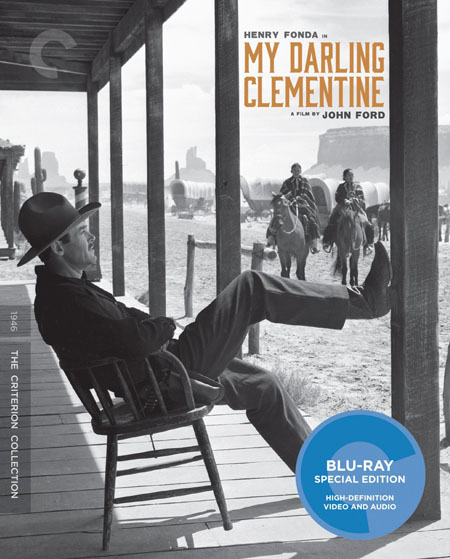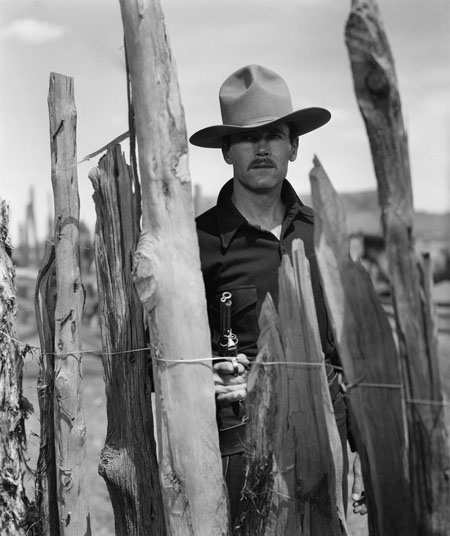
RETRO-ACTIVE: THE BEST FROM THE CINEMA RETRO ARCHIVE.
“GHOSTS OF MONUMENT
VALLEYâ€
By Raymond Benson
The
great John Ford made many outstanding westerns, and My Darling Clementine (1946) is certainly one of them. I would
argue that not since Stagecoach (1939)
had there been as good a picture in the genre, and it didn’t even star John
Wayne.
Purportedly
the story of Wyatt Earp, Doc Holliday, the Clanton Gang, and the gunfight at the
O.K. Corral, the film is hogwash as far as the truth is concerned. But as pure
entertainment, it’s right up there with the best of the classic westerns that
have given us stylistic and physical imagery that is today considered cliché.
And in order to become cliché, whatever it
is has to have been great to begin with. It must be a trend setter, a
groundbreaker, an artistic decision that resulted in an iconic piece of
celluloid. Much of what John Ford did accomplished just that. My Darling Clementine has it all—the
dumpy saloon with the honky tonk piano player and free-roaming prostitutes,
“Injuns,†cattle rustlers and thieves, stagecoaches and horses, ornery
villains, and, most of all—the scenery of Monument Valley, Utah.
The landscape of Monument Valley is a
character itself in Ford’s westerns. Even though we’ve seen the same buttes and
rock formations dozens of times, we always buy that we’re somewhere in the
“west,†in that mythical land of Hollywood archetypes. And what better
archetype is there to play our hero, Wyatt Earp (the film was loosely adapted
from Earp’s autobiography), than the inimitable Henry Fonda. Walter Brennan
makes a surprisingly nasty villain as Old Man Clanton. Linda Darnell, as saloon
girl Chihuahua is a stand out. More problematic is the casting of Victor Mature
as Doc Holliday. While the actor displays the requisite angst in the character,
he plays Holliday with no humor whatsoever, and it doesn’t quite work. After a
while he just becomes annoying for being grumpy and moody all the time.

Nevertheless, this is one of the
classics, folks. And, if you study it closely, there is a singular darkness in
the hearts of the characters—even the “good†ones—that suggests these
historical figures are now nothing but ghosts of a tall-tale-past where life is
cheap and death comes unexpectedly. Monument Valley, for all its beauty, is
fairly spooky at night—and much of Clementine
is shot at night. Even the blowing
dust during the climactic gun battle creates an eerie, ghost town effect. Clementine
is one of Ford’s blackest, most cynical films, but it’s cleverly disguised
as mainstream Hollywood entertainment. The picture has great atmosphere and
action, gorgeous black and white cinematography by Joseph MacDonald, and that
infectious song, “Oh My Darling, Clementine,†which I believe I first heard
sung by Huckleberry Hound. And while it
might offend nitpicky historians as to its accuracy... who cares? Legend is
myth and vice versa. Clementine doesn’t
possess the originality of Stagecoach nor
the sucker punch that is The Searchers,
but it definitely stands as one of Ford’s essential pictures.
Criterion’s new 4K digital restoration
of the theatrical release version looks terrific—I must say that I am very
impressed with Criterion’s handling of black and white films made prior to the
sixties. As with the earlier Fox release on DVD, the disk includes the early
“pre-release†version of the film, a work-in-progress as producer and studio boss
Daryl F. Zanuck re-cut Ford’s original submission. Further cutting ensued to
create the theatrical release version, and it is most interesting to explore
the differences in the two cuts. Another
port over from the Fox disc is the excellent comparison of the two versions by
film preservationist Robert Gitt.
New extras include a video essay by
Ford scholar Tag Gallagher; a new interview with western historian Andrew C.
Isenberg about the real Wyatt Earp; Bandit’s
Wager—and early silent short directed by Ford’s brother Francis, and
featuring John as an actor in a supporting role (!); television documentary
excerpts about Monument Valley and Tombstone, Arizona; and a Lux Radio Theatre adaptation from 1947
featuring Fonda and Cathy Downs (who plays Clementine in the film).
Excellent stuff.
CLICK HERE TO ORDER FROM AMAZON